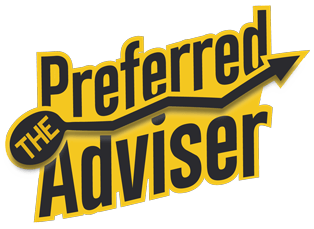SEO for financial advisors can seem overwhelming. It doesn’t have to be. The majority of financial advisors lack knowledge about search engine optimization or SEO.
It has become increasingly important for advisory firms to take basic steps to establish themselves as reputable and trustworthy in the eyes of Google.
Search Engine Optimization (SEO)
 The practice of improving the ranking of a website on search engines in order to increase its visibility and hence its traffic levels.
The practice of improving the ranking of a website on search engines in order to increase its visibility and hence its traffic levels.
A lot of money can be made by being the best search engine, so Google, Yahoo, and Bing invest hefty resources in trying to return the best search results for their users.
How can search engines determine which results are most relevant to a given search? The search engine looks for clues in user behavior like which results they click on, how long they stay on a site, and whether they continue their search or not after visiting a website.
But not all SEO is created equal. Search engines treat different types of searches differently. If you search “headaches and insomnia” on a credible national medical website, you will find information on the topic. If you search “plumber” you will find a local service provider.
When you search for “plumber” on Google, it will direct you to highly rated plumbers in your area instead of the definition of a plumber or the history of the plumbing industry.
The same is true for financial advisors. Google views financial planning as a local service and uses local search engine optimization “clues” to return the most relevant local financial advisors. These clues include:
- Whether your business address, hours, and phone number are listed
- How recently your website has been updated
- Whether your business is featured on Google and Apple maps
If you want to get more traffic to your website from people searching for financial advisors in your area, you should optimize your website for local search.
Benefits of SEO
- More traffic
- Look better in search results (building trust instantly)
- Support your referral process
Challenges With SEO for Financial Advisors
 Businesses commonly use online reviews to make themselves more trustworthy, but this is not allowed for advisors according to FINRA. To make the most of your business listings without using reviews, you need to follow a specific strategy.
Businesses commonly use online reviews to make themselves more trustworthy, but this is not allowed for advisors according to FINRA. To make the most of your business listings without using reviews, you need to follow a specific strategy.
There are many reasons why optimizing your website for search engines is important, not just for getting more traffic to your website. Make sure your site is optimized to look its best in search results by including images, maps, business hours, and your logo.
Making your search engine results page more informative can help your current clients find your office address or phone number online. When clients refer other people to you, it can help build trust and establish your credibility.
Establishing credibility online and helping your referral process
No one will give their life savings to a financial advisor if they googled the advisor and didn’t like what they found.
Customers explore businesses online before they make decisions. Referral sources are increasingly using Google to research potential new providers before making referrals, with 9 out of 10 referring sources admitting to doing so.
Potential clients will research your business online and form an opinion about how reliable you are, even if they have already met you in person. Each time a customer searches for your business in Google, they see different information depending on what type of device they are using. Are you hard to find online?
If you don’t show up on the first page of search results, you’re not likely to be found. If you want people to find your website, you need to show up on the first page of search results.
Do your social media profiles appear before your website when someone searches for your name? We want to make it easy for potential customers to find your business online and create a positive impression.
Getting more organic traffic to your website
The internet has had a huge impact on our lives, changing the way we do everything from choosing a restaurant to picking a financial advisor.
If financial advisors want to get more traffic and business, it can be helpful for them to show up within relevant search terms. There are two main ways to get more traffic to your website via search engines:
- Search Engine Marketing (SEM) or paid ads: Search engine marketing or pay per click (PPC) allows marketers to purchase traffic. Google sells placement within various searches at a price per click. Each time someone clicks your ad, Google charges your account.
- Search Engine Optimization (SEO): Think of the O in SEO as “organic.” With SEO, we are affecting the free or organic search traffic to your website. We aim to get your website to show up in those search results “organically” by being what Google considers the most relevant site to meet their search need.
On-Page SEO Tips
On-Page SEO involves optimizing the content on your website. When you include relevant keywords in your website content, it tells search engines that your site is relevant to people who are searching for those specific terms.
In this type of SEO, a financial advisor would do the following:
- Keyword Research – Looking for keywords to include on a page (more on this later).
- Content Creation – Publishing high-quality, informative content revolving around the keywords.
- Keyword Optimization – Adding the keywords in strategic places in the content. Avoid keyword stuffing and only add them where it makes sense.
- Website Design – A clean easy to navigate website will offer a good user experience which will keep people on your site longer. which helps with rankings.
One important factor in on-page SEO is having excellent content, as this can lead to higher rankings in the SERPs.
Title Tag
 The title tag is an HTML element that displays the title of your web page. title tags are an important part of SEO because they help search engines understand what your page is about.
The title tag is an HTML element that displays the title of your web page. title tags are an important part of SEO because they help search engines understand what your page is about.
Search Engine Optimization (SEO) is not the only factor that determines whether people will click on your link. The way your link appears on search results also plays a role in whether searchers will click on it.
Meta Description
The meta description is a brief explanation of what your page is about, located just below the title tag. It is the longer version of the title tag. The meta description is similar to the first HTML element in that it tells search algorithms what the topic of your content is.
Meta descriptions need to contain keywords in order for your page to rank in the search engine results pages.
Header Tags
HTML header tags (H1-H6) have been a part of SEO for a long time, but many people do not know much about them.
Header tags indirectly impact rankings by:
- Making content more scannable for an easy read.
- You are sending the right signals to search engines about what topic your content contains.
Image ALT Tags
When people visit your web page, they can see the photos that you have published on the site. But search engines can’t. This is where image ALT tags are useful.
An ALT tag is an HTML code that you can add to describe an image. It is also known as an “alt attribute” or an “alt description.” If your photos contain keywords in the tags, search algorithms will be able to more easily understand what the photos are about.
These tags are important because they improve the user experience and help with image search engine optimization. Alt tags provide search engines with additional information about an image through keywords.
Internal Links
Internal links are hyperlinks that go to another page on the same website. Internal linking is an essential step in SEO for the following reasons:
- It allows for more straightforward navigation on the website.
- It helps establish site architecture for the given website.
- It helps distribute link juices around web pages.
Both internal and external links help to give search engines information about the topic of your content. But internal links are used to show relationships between content.
Page speed
The speed of a page is a ranking factor that Google takes into account. This is a measure of how quickly the content on your web page loads. Page speed is often described as “page load time.”
A page’s loading speed is impacted by various factors, for example image compression, page file size, and the server the site is hosted on. If a page takes a long time to load, Google will lower that page’s ranking. This usually happens because the page has a low average time on page and a high bounce rate.
It is essential that you adopt the recommended SEO practices to improve the speed of your pages. There are several things you can do to improve your website’s loading speed, including enabling compression, reducing redirects, and improving server response time.
Off-Page SEO Tips
Off-page SEO involves optimizing efforts outside of your website. A financial advisor cannot control what other people say about him or her on the internet. For example, you found an authoritative website to link to your website.
That’s off-page SEO. Off-page SEO is optimizations that are not made on your own website. It is considered off-page because you didn’t change anything about your website. Off-page SEO helps improve a website’s ranking by addressing many different factors that are not part of the website itself. There are several important factors to consider. Some of the most important ones are listed below.
Links
Building links is at the core of off-page SEO. Links are one of the elements that Google uses to rank websites. Links are very important because they help search engines find new web pages. PageRank is used to help search engines determine how well a page should rank in the search engine results pages (SERPs).
External websites linking to a page is one way search engines measure how important a page is.
If you want your pages to rank higher on search engines, then make sure to include these kinds of links. They show the search engines that your page is high-quality and relevant to the keywords being searched. The more links you have from high-value websites, the better you will rank on the results page.
E-A-T
E-A-T in SEO stands for Expertise, Authoritativeness, Trustworthiness. It is one factor in determining Page Quality. The purpose of search results is to display pages that are beneficial.
If the website’s content is YMYL, its E-A-T level is considered. This ranking factor is important for topics that can potentially impact a searcher’s safety, financial stability, health, and happiness.
And what do these all mean? It all boils down to links and high-quality content. Google relies on E-A-T to give high rankings to webpages in its search results. By writing blog posts, you can help Google understand that you are a credible financial advisor that should receive high E-A-T.
Links are an important factor in improving your ranking in search engine results pages. The link should come from high-quality content for it to be effective. To create high-quality content, you need to focus on your E-A-T.
Social Engagement
Although Google has stated that social media is not a direct ranking factor for SEO, this does not mean that it is unimportant. Social media can indirectly influence your SEO ranking by increasing your brand’s visibility and creating backlinks.
What this means is that, although Google can’t see what’s inside an iframe, it can see how users interact with it. Google can’t see the content inside an iframe, but it can see how users interact with it.
Engagement metrics, like “shares,” play a role in SEO. How? The greater number of social shares your content receives, the more visibility it will have. Making your content visible to prospective customers sends the right signal that your content is high-quality and relevant to the keywords you are targeting.
Local SEO
According to statistics, nearly half of all Google searches are related to a specific location. And how do you take advantage of these searches? Through local search engine optimization.
This is the process of optimizing content to attract visitors through search engines. However, with this form of SEO, you are optimising for more relevant local searches.
Local search engine optimization is a vital investment because it results in 80% of local searches. Approximately half of all individuals who conduct a local search visit a store within one day.
If you are a financial advisor and someone does a local search for “financial advisors near me”, you have a better chance of being found by potential clients in your area.
This Involves Taking the Following Steps to Optimize Your Content for Local Searches
- Create a Google my Business listing
- Performing keyword research
- Creating content and blog posts with a local focus
- Acquiring high-quality links
- Outreaching
The Best Keywords for Financial Advisors
 You’ll want to consider which keywords to target before you make any changes to your website or register your business online, so that your efforts are consistent.
You’ll want to consider which keywords to target before you make any changes to your website or register your business online, so that your efforts are consistent.
Keyword traffic depends on simple supply and demand, so targeting high volume keywords will mean that you have more competition, whereas it may be easier to rank higher for lower volume search terms, though you’ll have less traffic to capture. Examples of Keywords for Financial Advisors:
- Financial advisor san diego
- Financial planning for women in des moines
- Financial advisor business owners chicago
You could also target services as a keyword:
Improve Your Website’s On-Site SEO
If you want your website to rank higher on search engines, you will need to make some changes to the most important areas of your home page and update your tags and descriptions. You may need your web designer’s help to finish the process.
Most advisors don’t use keywords on their homepage. If you want your website to be successful on Google, it is important to put keywords on your homepage and have accurate information. Make sure you include the following: NAME OF YOUR CITY + KEYWORDS Here are some examples:
- Fee-Only Financial Advisor in San Diego, California
- Retirement Planning in Roswell, Georgia
- Financial Planning for Business Owners in Newark, New Jersey
Check to Make Sure Your Website is Mobile Responsive
 If your website is not mobile responsive, Google will penalize it, so it is very important to check your site. Go to responsivedesignchecker.com to find out now.
If your website is not mobile responsive, Google will penalize it, so it is very important to check your site. Go to responsivedesignchecker.com to find out now.
Updating your title tags
After your homepage, title tags are the most important places to put keywords. They are the words that appear at the top of your browser and in search results. To update your title tags, either do it yourself via your website editor or ask your website developer to include your keywords in your title tags.
If you want to know how to update your website for better SEO results, sign up for this free webinar now. Your website’s title tags should be different for each page, and should include your targeted keywords as well as the main services you offer.
It is important to have good title tags on your website so that people can easily find the information they are looking for. For example, the title tag on the homepage of a website about financial planning for teachers in South Texas should be something like “Independent Financial Advisor Serving Teachers in South Texas.”
Similarly, the title tag on a page about retirement planning for teachers in South Texas should be something like “Retirement Planning for Teachers in South Texas.”
Optimizing Your Meta Descriptions
The final step in on-site SEO is to improve your meta descriptions. These are the brief descriptions that appear below your title tags in search results. The area where your site appears in search results is very important, as it influences whether searchers will click on your site.

0 comments